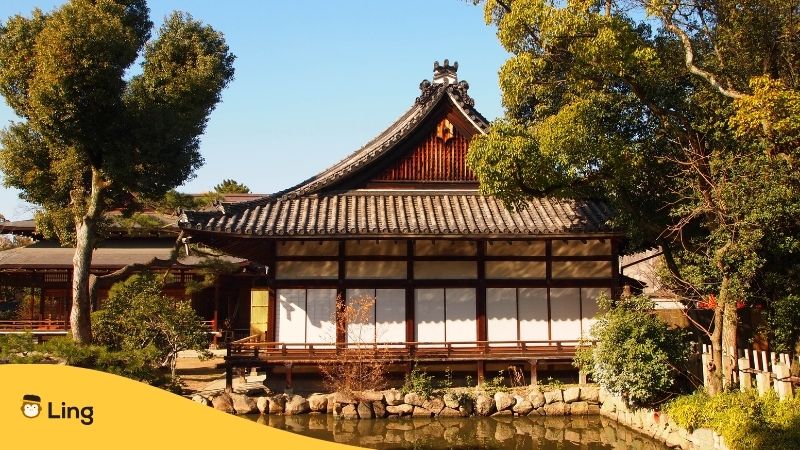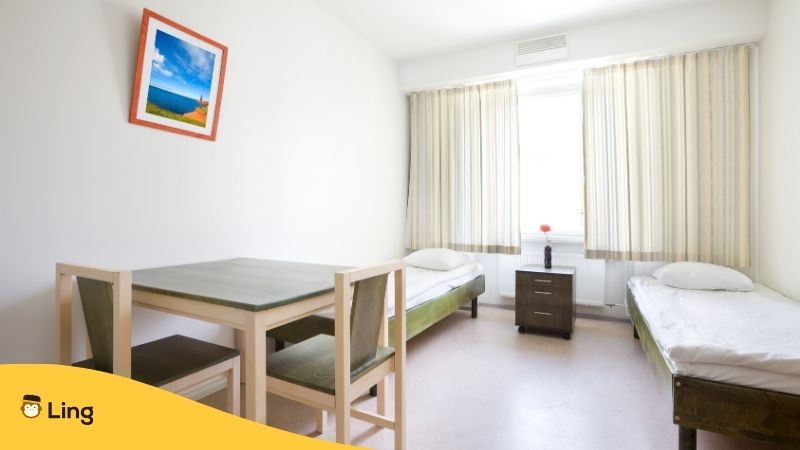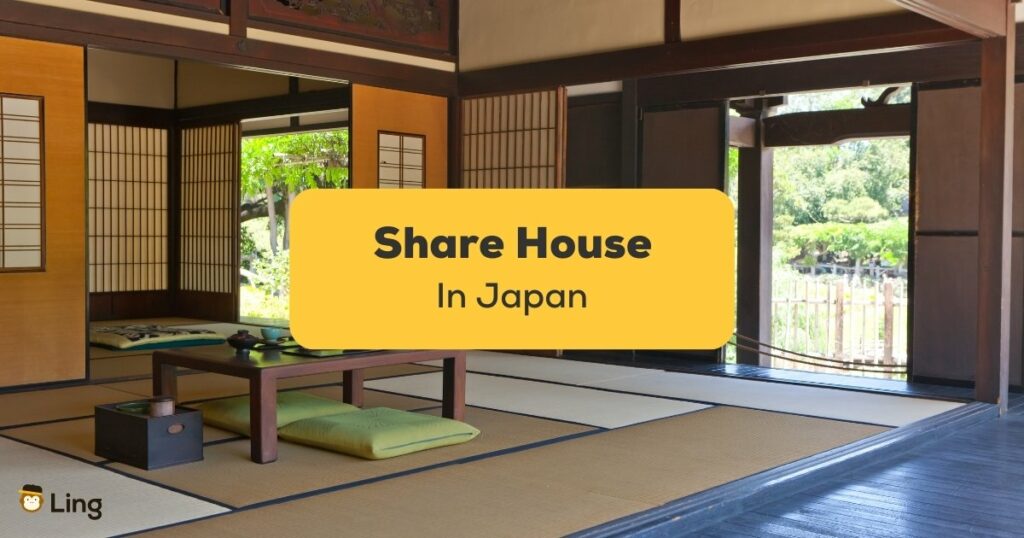When I first moved to Japan as an expat, one of the best decisions I made was to live in a Japanese share house for my first year. For those unfamiliar, a Japanese share house is when a group of people share a large house or apartment, with each person getting their own bedroom but sharing common spaces. I opted to rent a room with 7 Japanese housemates, which gave me a crash course in local culture while saving money on Tokyo’s crazy rents.
There are so many types of share houses in Japan, ranging from 5 to even 20 housemates and both shared rooms or getting your own closed bedroom. So, while a shared house takes adjusting to communal living compared to getting your own apartment, I wholeheartedly recommend it for at least your first few months when settling in as an expat or student.
If you’re considering one yourself, keep reading for the need-to-know details and top tips that I wish I had known before moving into my first Japanese share house!
Table of Contents

What Is A Japanese Share House?
In essence, a share house is when a group of usually 5 to 20 people jointly rent out a larger house or apartment together. Each tenant rents out their own private bedrooms within the share house. This bedroom is yours and comes furnished with the basics like a bed, desk, chair, shelves, and closet or storage space for your personal belongings. Some share houses offer closed, separated bedrooms with a door, while lower-budget ones have open bedroom spaces divided by partitions.
Outside of individual bedrooms, share house residents share the common living spaces and facilities. This includes bathrooms, laundry machines, a kitchen, a dining area, a lounge with TV/sofas, and sometimes a small yard or balcony space. The number of bathrooms, kitchens, etc, is dependent on the size of the share house and the number of residents. Unlike university dorm set-ups, most Japanese share houses are self-catered without meal plans, meaning residents use the shared kitchen to cook for themselves.
How Much Is The Rent In A Japanese Share House?
Luckily, one of the best parts of getting a room in a Japanese share house is you don’t have to coordinate or shell out cash directly with all your new roommates each month. The share house rental companies like XRoss House and Sakura House have already factored in all the costs upfront into your monthly rental rate, making payment a breeze.
Your monthly share house rent includes utilities like electricity, gas, and water bills, use of furnishings, appliances and amenities, internet connection fees, maintenance costs, and management fees for the rental company. Unlike some other countries, you won’t have surprise bills for utilities or other hidden costs on top of your room rate later – it’s all bundled in one predictable payment.
Of course, rent prices still vary widely depending on the share house’s location in Tokyo, room size, overall quality and facilities of the property, and the number of residents sharing it. To give you an idea, monthly rents for a room in a Tokyo share house can range from ¥20,000 to ¥80,000 ($150-$600 USD approx), with newer or larger places situated closer to Tokyo’s center topping the price range. But you’ll generally find rates much more reasonable than a studio or 1-bedroom apartment, especially given furnishings are included.
| Cost Type | Share House | 1R (Estimate) | 1LDK (Estimate) |
|---|---|---|---|
| Monthly Rent | ¥25,000 – ¥80,000 | ¥60,000 – ¥140,000 | ¥100,000 – ¥200,000 |
| Deposit | 1 month’s rent or slightly more | 1 – 2 month’s rent | 1 – 2 month’s rent |
| Key Money | ¥0 – ¥15,000 | ¥0 – 2 month’s rent | ¥0 – 2 month’s rent |
| Guarantor Fee | Included or nominal | 0.5 – 1 month’s rent | 0.5 – 1 month’s rent |
| Agency Fee | Not commonly required | 0.5 – 1 month’s rent | 0.5 – 1 month’s rent |
| Appliances | Included or minimal cost | ¥50,000 – ¥150,000 | ¥50,000 – ¥150,000 |
| Utility Bills | Included in rent | ¥8,000 – ¥20,000 | ¥10,000 – ¥25,000 |
| Maintenance | Included or minimal | ¥0 – ¥5,000 | ¥0 – ¥5,000 |

Are Japanese Share Houses Foreigner-Friendly?
The good news is – yes, many major share house companies explicitly welcome both Japanese and international tenants! Especially larger chains with tons of properties around Tokyo and other big cities. They have English-speaking staff on hand to help foreign applicants with paperwork, tours, and any language barriers living in the share house later. Some even offer private bedrooms with locks to give foreign residents more peace of mind.
That said, there are smaller, more traditional share houses that haven’t yet globalized or had many foreign tenants. Some Japanese people express concerns over understanding foreign cultures or feel anxious communicating fully in another language. As a result, a few landlords do subtly prefer Japanese applicants or flat out state no foreigners are allowed during showings.
My advice if you’re set on a share house is to seek out the larger, expat-savvy providers first. Ask specifically about any international residents already living there and English support services during your tour. Having bilingual staff and some globally-minded housemates already embedded makes fitting in far easier as a foreigner. Yes, smaller share house options still exist, too, but it may require more effort to find ones that embrace diversity.
Why Stay In A Japanese Share House
Firstly, the cost factor draws most newcomers. Renting just a single room with basics over an entire studio or apartment slashes housing budgets for Tokyo and other pricey Japanese cities. If you’re willing to adjust to having housemates, it’s quite easy to find shared housing for under ¥50,000 per month in great locations. Pretty much unheard-of rates for your own place!
In addition, furnished private rooms mean you don’t have to purchase all new home setups and appliances. Most share houses come equipped with free laundry machines too. Some even have bicycles or other handy amenities to use included too.
But my favorite part was getting immersed in local Japanese lifestyles, customs, and mindsets simply through everyday living side-by-side. My Japanese housemates taught me so many cultural quirks that sped up my adaptation process. We traded language lessons over dinner. And I made meaningful friendships spanning years.
Why Stay Away From A Japanese Share House
First and foremost – privacy. Or lack thereof. Walls in sharehouses tend to be thin. Resources like bathrooms are shared. There’s almost always someone else around in common areas. For those requiring more personal space or calm, it can prove challenging. You trade solitude for affordability and community.
Speaking of community, conflicts can crop up even in the most harmonious sharehouses. Just imagine people having different habits, schedules, cleanliness standards, and personalities sharing close quarters. While ground rules help, some adjustment is inevitable when your home includes 10+ strangers turned roomies overnight. Personalities don’t always perfectly mesh, even despite the best intentions all around.

Questions To Ask When Viewing Potential Share Houses
With so many options spanning sizes, locations, prices, and vibes around cities like Tokyo, narrowing down your search can feel overwhelming. Touring in person helps most to get a true feel for furnishings, cleanliness, and common areas. But what questions should you ask current residents or staff to determine if a share house is everything you hope for?
“What’s the gender, age, and nationality breakdown of current housemates?”
Diversity can enhance cultural exchange, although it might make initial mixing slower if languages vary greatly.
“What’s your approach for resolving conflicts between roommates?”
Having mediation processes prevents tensions from escalating later down the line.
“How often do social events or group activities happen?”
If you hope for lots of community bonding or made plans, it is best to clarify programming calendars match.
“Is the neighborhood loud at night or mostly residential?”
Double-checking noise levels and proximity to bars lets party animals or light sleepers verify fit.
“Does the landlord allow moving furnished into private rooms?”
If you have existing furniture shipped over, size, and flexibility matter.
Ready For Your Own Private Room?
Feeling energized to start hunting for your perfect Japanese share house fit? Finding the right communal home can make an enormous difference in your expat experience here by plugging into local friend networks, culture, and affordable Tokyo living.
If you remain on the fence, maybe try a short-term share house stay first through platforms like Airbnb to test dynamics out before a 6-month+ lease. The key is matching expectations to realities and asking all the right questions during showings.
And remember to show up with radical open-mindedness, cultural sensitivity, and understanding as you adjust. Respect house slippers policies, while neighbors adapt to your foreign oddities too! Compromise makes co-living flow beautifully.
Ready to turbocharge Japanese fluency too? Downloading the Ling app for daily language lessons will let you practice vocab with housemates over authentic home-cooked dinners in no time.



































































